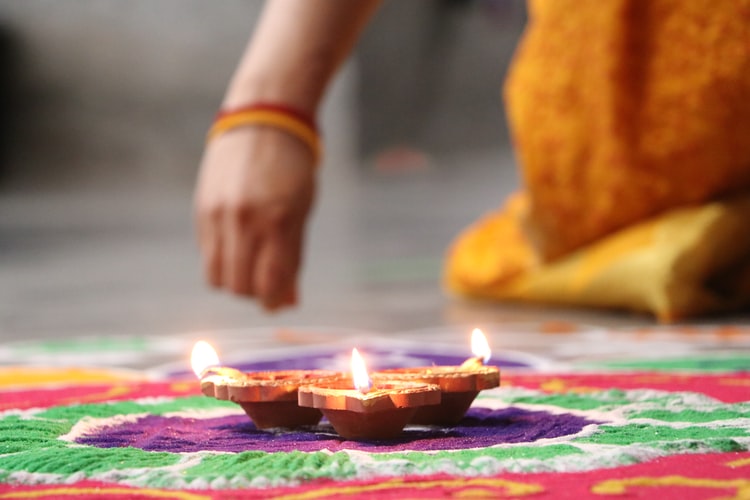The concept of Atithi Devo Bhava| Guest is God originated from ancient times when the guests or visitors used to pay a visit to their friends, families, or neighbors without announcing it.
The visits used to be unannounced because there were no technological fast means of communication available at that time.

Therefore, the impromptu arrival of guests has welcomed the idea ‘Atithi Devo Bhava’ that the ‘Guest is God’.
The phrase Atithi Devo Bhava simply means, ‘The Guest is God’. This phrase and its meaning had become an important practice since the times of ancient India, and even today it serves as the country’s motto to endow tourism.
The ancient Sanskrit phrase Atithi Devo Bhava, which means “A guest is akin to God,” comprises a profound idea engrained in the Indian Hindu-Buddhist heritage. It describes a dynamic that pervades the host-guest relationship, in which guests are venerated and treated with the utmost reverence, much like a deity. This philosophy extends a warm welcome to all visitors, going beyond the traditional Hindu-Buddhist greeting of namaste.

The Taittiriya Upanishad, a respected Hindu text, is the source of Atithi Devo Bhava. The word itself represents the core of this ancient literature, since it portrays a visitor who enters without a set schedule, symbolizing the presence of God. It is made up of the words “Atithi” which means “without a fixed calendrical time,” “Devo” which means “God,” and “Bhav” which means “Be” or “Is,” and it represents the profound belief that a guest is, in fact, a manifestation of the divine.
The host-guest connection is extremely important and revered in Indian culture. Atithi Devo Bhava displays this holy relationship, emphasizing that every guest, regardless of caste, colour, or creed, should be greeted with the utmost hospitality and affection. This one-of-a-kind code of behaviour, derived from the Taittiriya Upanishad, protects our culture’s values and heritage, ensuring that no guest ever feels forgotten or unwelcome. This practice is unwavering across our country’s wide cultural and geographical diversity.
Unfortunately, the actual core and spirit of Atithi Devo Bhava have dwindled with the passing of time. Our cultural legacy is gradually vanishing in an era of trade globalization and fast modernization. In the midst of fast-paced lives, we must pause to consider how much attention we pay to our rich, age-old traditions. It makes one wonder how many of us genuinely grasp and embrace the idea of Atithi Devo Bhava in our daily lives.
It is critical to preserve Atithi Devo Bhava in order to protect our cultural identity. It acts as a reminder that we should treat our guests with the same reverence and respect that we would give to a divine creature. It is a call to protect the values and traditions that have been passed down through generations, as well as to recognize the sacredness of human connections.
Atithi Devo Bhava Meaning
Atithi Devo Bhava is an Indian phrase originating from the scriptures of Sanskrit. This phrase has found a very superior abode in Indian culture and Buddhism.
In literal meanings, ‘Atithi means someone without a calendar, ‘Devo’ means God, and ‘Bhava’ means ‘be or is’.

The repeated emphasis of this idea in various religious references has taken the concept of ‘Guest is God’ far beyond the idea of tourism.
The Sanskrit term Atithi Devo Bhava, which is profoundly ingrained in India and Hinduism, is extremely important in creating cultural norms and sustaining the host-guest relationship. While it has gained popularity in recent years for promoting tourism, its origins may be traced back to ancient times when communication and set timetables were non-existent.
The unpredictability of visitors in the past led to the creation of Atithi Devo Bhava. The term “Tithi” relates to the calendar, whereas “Atithi” refers to someone who does not adhere to a fixed calendar. An Atithi is essentially a guest who can appear at any time, unexpected and unplanned. “Devo Bhava,” on the other hand, means “God-like.”
As a result, Atithi Devo Bhava emphasizes the need of treating our guests with the same respect and hospitality that we would extend to a divine creature.
Shikshavalli I 11.2 of the Taittiriya Upanishad contains the essence of Atithi Devo Bhava.
This ancient text eloquently embodies the idea by encouraging us to see our mother, father, instructor, and guest as celestial embodiments. The phrase emphasizes the need of reverencing and honouring these people, recognize their importance in our lives, and treat them with the utmost care and dedication.
We recognize the intrinsic value of maintaining a harmonious host-guest relationship by adopting Atithi Devo Bhava. It exhorts us to welcome people who enter our homes with open arms and warm hearts, regardless of their socioeconomic class, background, or origin. We are reminded to respect and admire our guests in the same way that we respect and admire our parents, teachers, and mentors.
This ancient philosophy not only encourages a feeling of inclusion and harmony, but it also embodies Indian culture’s essential values. It represents the deeply held concept that every visitor should be greeted with real love, hospitality, and care.
We take the act of hosting beyond mere formality and transform it into a passionate statement of reverence by treating our guests as we would treat God.
In a world that frequently appears distant and fractured, Atithi Devo Bhava is a striking reminder of humanity’s interconnectedness.
It crosses ethnic and theological divides, asking us to embrace the universal value of treating individuals who come into our lives as guests with warmth and respect.
The people in India make special efforts to strengthen and bloom the host-guest relationship.
They try to give paramount importance, respect, and attention to their guests by serving them with various resources they can afford irrespective of their financial status.
These practices are the reason that the world gets to see a lot of examples of ‘Atithi Satkar’ meaning to welcome the guest with utmost respect and importance.
Being such an important part of the Indian culture and society, Atithi Devo Bhava says that every guest that happens to be at your door should be paid with the highest respect and attention no matter if the guest belongs to your family or not.

The idea of Atithi Devo Bhava rejects any and all preferences based on the guest’s caste, creed, color, or creed.
He/She should be given the ultimate attention, importance, and comfort because He/She is God in the face of a human.
Atithi Devo Bhava Full Shloka
The concept of Atithi Devo Bhava was first found in the scripture Shijshavalli I 11.2 in Taittriya Upanishad.

Taittriya Upanishad was originated in the Vedic Era and describes the prayers, instructions on phonetics, ethical and moral advice, and philosophies of life.
The complete shloka of Atithi Devo Bhava is given as follows:
“मातृ देवो भव।
पितृ देवो भव।
आचार्य देवो भव।
अतिथि देवो भव॥
Honor thy Mother as God.
Honor thy Father as God.
Honor thy Teacher as God.
Honor thy Guest as God.”

Every human being in the universe is a manifestation of God and his teachings for mankind.
Every human being in the universe is a part of God, therefore, it is the ultimate spiritual dharma or Karma Yoga of every human to respect and honor other beings.
According to the shloka of Atithi Devo Bhava, one should honor their mother and father just like God because their birth and the birth of their offspring is the result of their mother and father.
Similarly, a true teacher is the one that teaches the true meaning of life and the correct way to spend that life for the service of other creatures of God.
Such a teacher is no less than God and should be treated in the same way.
The greatest souls and the greatest blessings in the world come spontaneously in our lives and so do the guests, therefore, the Guests should be inferred as Gods.
Atithi Devo Bhava in Sanskrit
The Sanskrit shloka of Atithi Devo Bhava (अतिथिदेवो भव:) means guests are God.
There are many other shlokas in Sanskrit that are related to guests. Given below are some of them:
1. गृहस्थानां च सुश्रोणि नातिथेर्विद्यते परम्।
There is no bigger service or duty for humans than to welcome or warmly treat the guests.
2. काम्यकर्मफलं लब्ध्वा गुरूणामुपपादयेत्।।
Whether it is a foreign land or our own country, it is the duty of all of us to welcome guests and feed them. The deeds of doing good things have to be dedicated to our gurus.
3. दद्यादपरिक्लिष्टमन्नमध्वनि वर्तते। श्रान्तायादृष्टपूर्वाय तस्य पुण्यफलं महत त्।।
People who feed the unknown and hungry visitors are bound to receive blessings from the almighty.
4. मोघमन्नं सदाश्नाति योSतिथिंं न च पूजयेत्।
It is useless having food if you cannot treat your guests properly.
5. श्रान्तमध्वनि वर्तन्तं वृद्धमर्हमुपस्थितम्। अर्चयेद् भूतिमन्विच्छन् गृहस्थो गृहमागतम्।।
For one’s betterment, married people should consider serving tired and unknown guests properly.
6. चक्षुर्दद्यान्मानो दद्याद् वाचं दद्याच्च सूनृताम्। अनुव्रजेदुपासीत स यज्ञः पञ्चदक्षिणः ।।
Whenever guests visit your place, you should talk to them politely and behave in a sweet tone till they leave your place. Also, at the time of leaving, you should drop them till the entrance of your place. This approach is akin to receiving 5 types of honorariums.
7. अभ्यागतो ज्ञातपूर्वो ह्यज्ञातोSतिथिरुच्यते। तयोः पूजां द्विजः कुर्यादिति पौराणिकी श्रुतिः ।।
अतिथिं नावमन्येत नान्नृता गिरमीरयेत्। न पृच्छेद् गोत्रचरणं नाधीतं वा कदाचन।। यदर्थो हि नरो राजंस्तदर्थोSस्यातिथिः स्मृतः ।।
Guests should be served with only those items that are used by people themselves.
8. अतिथिर्यस्य भग्नाशो गृहात् प्रतिनिवर्तते। स दत्त्वा दुष्कृतं तस्मै पुण्यमादाय गच्छति।।
Guests who leave a house without getting a proper welcome are bound to collect all the good deeds of the host whilst leaving behind curses.
9. नावमन्येदभिगतं न प्रणुद्यात् कदाचन। अपि श्वपाके शुनि वा न दानं विप्रणश्यति। श्रान्तमध्वपरिश्रान्तमतिथिंं गृहमागतम्। अर्चयीत प्रयत्नेन स हि यज्ञो वरप्रदः ।।
Hosts should welcome tired guests who come walking to their place. This way all their wishes will come true.
10. पाद्यामासनमेवाथ दीपमन्नं प्रतिश्रयम्। दद्यादतिथि पूजार्थं स यज्ञः पञ्चदक्षिणः ।।
Hosts who serve the guests by providing water to wash their feet, a seat to make them seated comfortably, illuminate the place by switching on the light, and a food to eat stand to receive 5 types of honorariums in return.
Atithi Devo Bhava Logo

Atithi Devo Bhava’s logo shows two hands joined together. The gesture of two hands joined together is a common one that the Indians make when they are greeting someone.

The concept of Atithi Devo Bhava, with its profound message of treating guests as equivalent to God, has transcended beyond just a philosophy. It has been embraced as a powerful symbol, represented by the Atithi Devo Bhava logo.
This logo encapsulates the essence of Indian hospitality and serves as a visual reminder of the importance of honouring and welcoming guests with open hearts.
With its vibrant colours and graceful design, the Atithi Devo Bhava logo stands as a beacon, guiding us to uphold the timeless values of warmth, respect, and reverence towards those who enter our lives as guests.
Therefore, the hands joined together reflect the ultimate gratitude, respect, and honor that one feels when welcoming a guest into their service.
Atithi Devo Bhava Quotes
Atithi Devo Bhava is a prevalent and widespread ideology all over India.
Every Indian, no matter their financial or social status, respects their guests and tries their level best to please them.
This rife respect for Atithi Devo Bhava has given birth to several different quotations and slogans that reflect the same idea about respecting guests.
Some of these quotations/slogans devised from Atithi Devo Bhava are:

“Guest is God, and God is great.”
“Atithi comes like a pleasant rain.”
“Service to guest is our tradition, please pay it respect.”
“Keep India clean and play a good host to your guests.”
“Hospitality is our reputation and quality.”
“Atithi brings good luck and happiness.”
Atithi Devo Bhava in Hindi
The phrase “Atithi Devo Bhava” in Hindi reflects the spirit behind welcoming guests and how they are treated equal to gods. This Hindi phrase and the tradition behind it have been in use in India for several centuries. The warm hospitality Indians extend to guests can be experienced everywhere, despite the country being diverse and culturally varied.
Atithi Devo Bhava Taken From
The ancient Indian phrase “Atithi Devo Bhava” has been taken from the Hindu scripture of the Taittiriya Upanishad. This phrase was coined to describe visiting person/persons whose arrival and departure timings are not fixed.
In Taittiriya Upanishad, this unique code of conduct has been mentioned to uphold Indian heritage and values. Despite the diversity in geography and culture in our country, the way we treat our guests remains the same.
Atithi Devo Bhava in which Upanishad
The phrase ‘Atithi Devo Bhava’ has been derived from the Taittiriya Upanishad. It is an ancient Indian phrase that highlights the importance to be given to a visiting guest.
Atithi Devo Bhava Movie
The main roles in the Telugu film “Atithi Devo Bhava” are played by outstanding performers Aadi Sai Kumar and Nuveksha. The plot centers around Abhay Ram, played by Aadi Sai Kumar, who tragically loses his father at a young age. Despite this setback, Abhay receives comfort and constant affection from his adoring mother, who nurtures and cares for him with unshakable love. Abhay’s life is impacted by his father’s absence, which causes him to struggle with the anxiety of being alone.
Abhay inherits his father’s characteristics as he gets up and starts on a fantastic trip. He rises to the position of CEO at a well-known corporate firm and achieves enormous success. During this period of his life, Abhay unexpectedly meets the love of his life, Vaishnavi, played by Nuveksha. Their meeting is a fortuitous chance, and their love story evolves naturally, with no extra drama.
To Abhay’s astonishment, his relationship with Vaishnavi develops smoothly, bringing them closer to marriage. In an unexpected turn of events, Abhay overcomes his deep-seated psychological anxieties, allowing him to accept love and commit to a lifelong partnership with Vaishnavi. The film finishes with Abhay and Vaishnavi starting on a wonderful path of wedded bliss, putting behind all of Abhay’s concerns and insecurities.
What is the Meaning of the Expression Atithi Devo Bhava?
The Taittiriya Upanishad, from which “Atithi Devo Bhava” is derived, captures the core of Hinduism and Indian culture. A person without a Panchang, or set timetable, is referred to as “Atithi”. The word “Devo Bhava” means “like God.” Together, they suggest that visitors should be seen as manifestations of the divine rather than as plain intrusive strangers.
“Atithi Devo Bhava” serves as a sad reminder of the deeply held Hindu conviction that each person possesses a divine nature. It emphasizes how crucial it is to treat our guests with the utmost respect because doing so is comparable to honouring God.
This potent way of thinking has been essential in building deep ties between hosts and visitors. It encourages hosts to exhibit loving hospitality and embrace guests with open hearts by treating them as images of God. A healthy and respectful relationship has been established between host and guest as a result of the philosophy of seeing the divine in each visitor.
What is the Origin of Atithi Devo Bhava?
The origin of the concept of Atithi Devo Bhava can be traced back to the rich legends and scriptures of Hinduism and Buddhism. These tales beautifully illustrate the profound significance of treating guests as embodiments of the divine.
One such legend is found in the Bhagwat Purana, revolving around Sudama, a Brahmin who was a childhood friend of Lord Krishna. Over time, Sudama’s family faced severe poverty, and his wife, Susheela, suggested seeking help from Lord Krishna. Initially hesitant, Sudama eventually decided to visit his friend.
Though he had nothing grand to offer, Sudama brought Lord Krishna the last grains of beaten rice as a humble gift. Lord Krishna received Sudama with immense love, respect, and grandeur, exemplifying the essence of Atithi Devo Bhava.
When Sudama returned to his humble abode, he was astounded to find it transformed into a magnificent mansion. This story beautifully emphasizes the significance of welcoming guests as gods or Atithi Devo Bhava.
In addition to Sudama’s tale, numerous other legends glorify the spirit of Atithi Devo Bhava in India. One such tale centres around Sabari, a woman from a tribal village. When Lord Rama visited Sabari’s ashram, she offered hand-picked Jujube fruits, tasting each piece to ensure its sweetness before presenting it to Rama.
Lord Rama graciously accepted and consumed all the Jujube fruits that Sabari had tasted. This tale showcases the deep-rooted belief in India’s culture that guests should be honoured and cherished with utmost devotion.
Such legends and stories beautifully reinforce the importance of Atithi Devo Bhava in Indian society. They serve as timeless reminders of the value placed on extending warm hospitality and treating guests as embodiments of divinity. By welcoming guests with open hearts, love, and respect, we not only uphold our cultural heritage but also foster an atmosphere of harmony, generosity, and mutual respect.
What is India’s Atithi Devo Bhava Policy?
Every year, millions of tourists from all over the world visit India because of its rich cultural legacy and unique attractions. To boost tourism and provide a warm and welcoming environment for visitors, the Tourism Department of India launched the Atithi Devo Bhava campaign, with the theme “Incredible India.”
“Atithi Devo Bhava,” which translates as “Guest is akin to God,” is a significant social awareness campaign. Its goal is to instill a culture of hospitality and make inbound tourists feel truly welcomed by the country. The campaign not only addresses the general public but also major stakeholders in the tourism industry.
Recognizing the important role that varied staff have in moulding tourists’ experiences, Atithi Devo Bhava offers extensive training and orientation programs. Taxi drivers, guides, immigration agents, police officers, and other professionals who contact directly with tourists are trained to provide great service. They are educated to manage a variety of needs and to convey a positive image of Indian hospitality.
The campaign emphasizes the significance of treating tourists with civility, respect, and friendliness. It encourages stakeholders to go above and above in terms of hospitality by promoting cultural awareness. Personnel plays a critical role in moulding visitors’ views and building a lasting sense of India as a welcome place by implementing the ideals of Atithi Devo Bhava into their interactions.
Is Atithi Devo Bhava from Upanishad?
Derived from the Taittiriya Upanishad, “Atithi Devo Bhava” embodies the essence of Indian culture and Hinduism. “Atithi” refers to someone without a Panchang, or a fixed schedule. “Devo Bhava” translates to “like God.” Together, it conveys that guests should be regarded as embodiments of the divine and not mere unwelcome visitors.
The phrase “Atithi Devo Bhava” is a poignant reminder of the profound Hindu belief that the divine essence resides within every individual. It emphasizes the importance of treating our guests with utmost reverence, as it is akin to honouring God Himself.
This powerful philosophy has played a vital role in fostering meaningful connections between hosts and guests. By treating guests as manifestations of God, it inspires hosts to extend warm hospitality and embrace them with open hearts. The approach of seeing the divine in every guest has strengthened the bond between host and guest, creating a harmonious and respectful relationship.
Why India is Called Atithi Devo Bhava?
The meaning of Atithi Devo Bhava is ‘Guest is God’. This concept is not a new one in India and it is found to be deeply embedded inside the ancient Indian scriptures and teachings of Buddhism.
According to this concept, every Indian (or human being) must pay the highest respect, importance, and attention to its guests.
The host should focus on maintaining a strong host-guest relationship, and should not indulge in making preferences based on the guest’s caste, creed, color, or social background.
Indians practice this ideology in their daily life not only because it has a religious meaning but because they believe in this ideology.
This practice, over the years, has helped India achieve a status of being a good host to their guests which has allowed the Indian tourism industry to flourish within the past few years.
Indian hotels display the preeminent quality of hosting service, also, the people living near the tourist areas in India practice this concept very dearly.

India is called Atithi Devo Bhava because of all the qualities of good hosts that the people in India possess.
They make sure that their guests feel welcomed and important in their presence and they try to offer the best of their resources to their guests or even try to arrange them for their guests if they don’t have them for themselves.
They try to keep everything up to the comfort and standard of their guests keeping extra attention over their likes and dislikes in matters of food, clothing, and ambiance.
How Relevant is the Concept of Atithi Devo Bhava?
The concept of Atithi Devo Bhava is not recent. It originated in scriptures in the Vedic Era and has been present in practice long before that time.
The reason that this concept came into place such a long time ago was that most of the guest arrivals at that time used to be unannounced.
The reason because people couldn’t inform the hosts about their arrivals due to the unavailability of technological means of communication.
Presently, the means of communication have evolved to a wonderous extent and letting someone know about your arrival is not a problem anymore.
However, there are still conditions where the guests can come impromptu, therefore, the concept of treating unannounced guests with great respect and love is still intact with the Indian culture.
Atithi Devo Bhava, however, has lost its true meaning over time because humans have engaged themselves in countless other matters that leave no time or energy behind to practice Atithi Devo Bhava with its true spirit.
The wave of globalization has helped the Indian nation greatly with its limitless growth, but on the contrary, it has also eroded ancient cultural concepts.
It is on the nation to realize that where everything has become so easy and so accessible, how much time do they spare to re-visit the institution of their rich, old culture and its long-lost teachings?
The concept of Atithi Devo Bhava is still relevant, whereas, the only concept that is irrelevant is the concept of modernization that has left everyone off track.
In Which Country Guest is Considered As God?
India is one of the countries in the world that follow the practice of treating their guests as God.
They follow the Sanskrit phrase, Atithi Devo Bhava which means that the guest is God.
The people in India make sure to follow this ideology in every part of their life, also, the tourism department in India has adopted this teaching as their motto.
They aim to provide unsurpassed tourism services to the people visiting India for tourism from around the globe.
How Was Atithi Devo Bhav Started?
The phrase Atithi Devo Bhava has its genesis from the scriptures of Taittriya Upanishad’s Shijshavalli I 11.2.
According to the writings of Taittriya Upanishad, one should treat his/her mother, father, teacher, and guests as God.

The idea of treating guests like God came into the culture of ancient India well before the Vedic Era.
As the name suggests, Atithi means a person without a calendar (unannounced guest) and Devo Bhava means ‘like God’.
In older times, people used to arrive as guests/visitors to other people without announcing because, unlike the present, there were no rapid means of communication.
Atithi Devo Bhava With Respect to Tourism
The concept of tourism in India came later, whereas, the concept of guests came into India a long time ago.
Indians have practiced the most preeminent ways of tourism long before the idea of tourism became commercialized.
For a long time, the aim of Indian people was to serve their guests with love, attention, and importance without having any sense of earning money.

Indians follow the basic rules of welcoming guests to their hotels or guest houses even if they are doing it in the form of a lodging service for tourists.
They consider all the factors that were described in the ancient scriptures before starting a host-guest bond with any person/group.
These rules of hospitality and care have become an integral part of the Indian culture and people no matter if they are providing a service or doing it as a family or friend.
It also does not matter for them if they are doing it in their own country or if someone has come across their hotel in a foreign country. Indian people make sure to fulfill every factor of Atithi Devo Bhava.
To take a better understanding of Atithi Devo Bhava in terms of tourism, the following five rituals must be known to every person who wishes to follow this practice for paid or unpaid services to the guests:
1. Dhupa
Dhupa instructs the hosts to provide a room to their guests that are blooming with a soft cherishing fragrance.
This provides a sense of comfort to the guests while maintaining a sagacity of hygiene.
2. Diya

While welcoming guests, Indians use a fire lamp lit inside a clay pot called ‘Diya’.
The purpose of doing so came from the older times when people used to light up Diyas to provide light for the incoming guests and visitors.
This ritual got carried forward to the current times and is still followed in Indian households and tourism services.
Also, lighting up a Diya also serves as a supplication to the Lord of Fire, the Agni Deva.
Offering this supplication serves as gratitude to the blessing of God that came in the face of guests.
3. Naivedya
The concept of Naivedya calls for offering refreshing food delights to your visitors or guests.
In Naivedya, people mostly offer fruits and sweets made from milk because it is a tradition since the start of Atithi Devo Bhava.
In the older days, people used to travel by foot or on the back of some animal, both of which were very tiring ways of traveling.
Therefore, fruits and other dairy products were offered to them so that they could refuel themselves after long tiring journeys.
4. Akshata
In the ritual of Akshata, the host applies a Tilak on the forehead of the guests with rice grains or Akshata on it.
The reason for doing so is to provide a unique and profound sense of welcome to the guest or visitor.
To provide such an unforgettable experience that wherever they may go in their lives they may never forget the welcoming energy that they experienced under an Indian guest.
Also, the practice of the Akshata ritual gives off a sense of undividedness to the guests and visitors.
It says, through the gesture that, we all are undivided and are part of the same family or the same background.
This provides a sense of home and comfort to the guests and visitors.
5. Pushpa

When visiting or departing from a place of stay, everyone carries memories with them.
The degree of fondness of those memories depends on the level of comfort, attention, and services provided by the host; may it be a paid stay in terms of tourism or a family/friendly stay.
The ritual of Pushpa is such that it aims to fulfill the guest’s memories with the best memories.
When practicing Pushpa, the guests offer fresh flowers to their guests at the time of their arrival, or sometimes at the time of their departure.
This leaves behind a sense of goodwill and strengthens the host-guest relationship.
This practice is not only followed in the tourism services of India but it can also be seen clearly in the Indian households that still value this incredible tradition.
What Are Some Good Examples of Atithi Devo Bhava?
Atithi Devo Bhava is not only a concept of mind, rather, but it is also a practice that is readily done all over India.
There are various examples of Atithi Devo Bhava from people of different classes in India.
Below given are some good examples of Atithi Devo Bhava that will surely inspire people over the globe to practice this concept:
Ex. 1
Atithi Devo Bhava asks for a person to greet and respect unannounced guests with the same respect and honor that they would offer to God because of Atithi Devo Bhava (Guest is God).
If a person comes home tired and suddenly hears a ring at their doorbell, opening to see a pair of unannounced guests from family/friends. What would they do?
Naturally, a tired human being would find it inconvenient to entertain the guests in that state.
However, to put down a good example of awesome that person would allow the guests in and make every possible effort to serve them equally as God.
Ex. 2
Believing and practicing this great tradition means being ready for any spontaneous guest or visitor that comes to your doorstep.
A good example of this tradition would not only require the host to accommodate the guests with proper resources, but it will also ask of the guest to provide paramount honor, respect, and importance to the guest.
If the case at hand is about a tourism service, it is their duty in the light of ‘Guest is God’ to provide any and every possible service that their guest may ask of.
Also, the tourism service or a regular host must try to take care of the five rituals of Atithi Devo Bhava (Dhupa, Diya, Naivedya, Akshata, and Pushpa).
These are the general example cases that may come across in daily life.
There are hundreds and thousands of real-life examples of the greatest display of Atithi Devo Bhava that people have experienced and provided in India or other places in the world.
courtesy: google images
References
- https://noworriescurries.com.au/blogs/no-worries-curries-blog/atithi-devo-bhava-the-guest-is-god#:~:text=In%20one%20of%20the%20ancient,Bhava%20means%20’to%20be‘.
- http://www.hemantlodha.com/guest-god/
- https://brainly.in/question/406884
- https://indianspiritualvision.blogspot.com/2015/04/maathru-devo-bhava-pithru-devo-bhava.html
- https://en.wikipedia.org/wiki/Atithi_Devo_Bhava
- https://www.indigos.co.uk/atithi-devo-bhava/
- https://noworriescurries.com.au/blogs/no-worries-curries-blog/atithi-devo-bhava-the-guest-is-god
- https://pujayagna.com/blogs/hindu-customs/atithi-devo-bhava
- https://www.sanskritimagazine.com/culture/atithi-devo-bhava/





